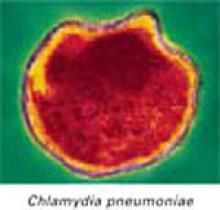Objective
Patients with immunoglobulin (Ig) G antibodies to Chlamydia pneumoniae tend to have a higher incidence of atherosclerosis. Since preeclampsia has many of the same pathophysiologic features and risk factors as coronary heart disease, the researchers investigated whether women with these antibodies also have a higher incidence of preeclampsia.
Methods and results
Investigators randomly collected serum samples from 74 nulliparous pregnant women—37 with preeclampsia and 37 with uncomplicated pregnancy—at the time of admission for labor and delivery. They then compared antibody titers for IgG, IgM, and IgA seroprevalence to Chlamydia pneumoniae, as well as IgG seroprevalence to Chlamydia trachomatis and Chlamydia psittaci, in the 2 groups.
IgG antibodies to C pneumoniae at a titer of at least 1:16 were more common in women with preeclampsia (25 of 37) than those without preeclampsia (15 of 37) (odds ratio 3.1; 95% confidence interval 1.2, 7.9).
There were no significant differences in the seroprevalence of IgA or IgM antibodies to C pneumoniae. Women with preeclampsia also were no more likely to have IgG antibodies to C trachomatis or C psittaci.
These data suggest a specific association between infection with C pneumoniae and preeclampsia.
Expert commentary
I began reviewing this article with 2 strong positive biases. First, Dr. Roberts is a respected colleague as well as a meticulous and honest investigator. Second, I believe that everything of importance in obstetrics and gynecology is somehow related to infection, bacteria, viruses, prions, and cytokines.
Those disclaimers aside, I was favorably impressed by this study.
The authors make a good point when they argue that past infection with C pneumoniae could be another risk factor for preeclampsia. However, since this study represents only the first step of investigation, it would be wise to avoid overenthusiasm.
Specifically, I don’t want to see a repeat of our current, very narrow strategy for preventing newborn group B streptococcal infections. The complete focus on extensive intrapartum antibiotic administration to mothers has resulted in an increase in newborn Gram-negative aerobic infections that, in 1 large study, matched the decrease in group B strep.1 The result: a zero-sum gain. Therefore, before we add macrolides to our prenatal vitamins, further investigation must be performed.
Although the statistical differences noted in this study are significant, the total patient population is small. Additional studies with larger numbers of patients are needed to verify these results. If confirmed, we would need careful prospective studies with selected therapeutic interventions to see if the progression to preeclampsia can be avoided.
Like all good studies, the results raise more questions than answers. I’m not an expert on preeclampsia, but I have been struck by how little attention—in the obstetrical literature—has been paid to the later life experiences of preeclamptic patients. I would assume that IgG C pneumoniae -positive preeclamptic women have a higher incidence of coronary artery disease in later years. Do we know the lifetime risks of preeclamptic patients? Perhaps it was C pneumoniae and not continuous medroxyprogesterone acetate that was the real culprit in the Women’s Health Initiative.
Bottom line
This well-conducted study presents preliminary evidence that past infection with C pneumoniae could be another risk factor for preeclampsia. Additional studies with larger patient populations are warranted to elucidate the clinical import of these findings.


